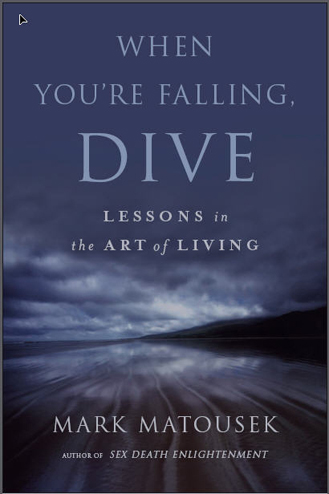You can leave this site quickly.
Learn more about Internet safety.
Recommended Reading - Reunion Issue No. 2

Broken Open: How Difficult Times Can Help Us Grow
By Elizabeth Lesser, co-founder of the Omega Institute, the world’s largest center for spiritual retreat and personal growth

When You’re Falling, Dive: Lessons in the Art of Living
By Mark Matousek, co-chair of V-Men, an international organization to end violence against women
___________________
Life throws curve balls. Sometimes they hit us head on, knock the wind out of us, leave us lying on the ground, shaken and stunned. We have two choices: We can stay there on the ground, wondering what just happened; or we can stand up, brush ourselves off and steady ourselves for whatever is coming next.
In Broken Open: How Difficult Times Can Help Us Grow, Elizabeth Lesser shares how she learned to give herself permission to come undone in challenging moments. In those moments of doubt and confusion, she sat with her suffering—rather than deny it—and she cradled herself in the knowledge that when the suffering passed, she would begin anew. Lesser writes: “When we descend all the way down to the bottom of a loss, and dwell patiently with an open heart in the darkness and pain, we can bring back up with us the sweetness of life and the exhilaration of inner growth. When there is nothing left to lose, we find the true self—the self that is whole, the self that is enough, the self that no longer looks to others for definition, or completion, or anything but the companionship on the journey.” In the depths of her despair, Lesser was met with discovery.
Mark Matousek embraces this same idea of plunging—despite fear or pain—into self-discovery amidst suffering. In his part-memoir, part-guidebook, When You’re Falling, Dive: Lessons in the Art of Living, he compares humans to the American lobster, “which dives for a few days each year to the ocean floor to slough off its old shell and wait for a new one, a naked, pink-skinned glob of flesh trying not to get smashed too hard before its second skin grows back.” To accept and embrace this vulnerability is a transformative first step toward healing.
Both Lesser and Matousek explore their own metamorphoses and also the life-altering experiences of others. Spiritual teacher Ram Dass spoke at length with Matousek about the stroke that left him partially paralyzed. Despite the challenges he has encountered, Dass now considers the stroke to be an act of grace, one that has given him the gift of perspective. Dr. Rachel Remen, who was diagnosed with Crohn’s disease at age 15, tells Matousek: “When we try to avoid loss or plow through our pain, our lives are actually diminished. On the other hand, there’s an extraordinary wisdom and clarity that emerges in people who genuinely meet their pain, not in theory but in life.... The process of wounding actually awakens us to our strength.”
The ways in which we suffer are unique to us, but the reality of suffering is universal, as is the healing that must follow. Lesser and Matousek explore this theme deeply and honestly in their respective books. And those curve balls we take in the eye, the ribs—the heart? Lesser and Matousek would likely both argue that no matter what kind, how hard, or even how many come our way, we all have the ability—and more importantly, the choice—to turn toward the pain. And by honoring our suffering, we move toward healing and self-discovery.




Your Voices